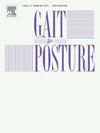愤怒会影响年轻人走路和发短信时的行为和生理关联
IF 2.2
3区 医学
Q3 NEUROSCIENCES
引用次数: 0
摘要
目的研究短信情感内容对走路和发短信双任务时步态和生理指标的影响。方法34名年轻成人采用基于文本的自传体记忆范式进行双任务行走研究。参与者在步行两分钟时发短信讲述自传式的情感经历(中性、快乐、悲伤、愤怒、恐惧)。他们走路时也不发短信。记录行走参数和打字速度,以及心率变异性(HRV)的测量来评估自主神经系统的反应。结果走路时发短信会降低步态速度,增加步幅时间,但对步幅长度和步态变异性没有影响。双任务行走时HRV降低。情绪内容影响步态速度,愤怒时的速度比悲伤时更快。HRV分析显示,与中性步行相比,愤怒步行时交感神经活动增加。打字速度不受情感内容的影响。结论使用基于文本的自传体记忆范式可诱导年轻人在双任务行走中产生特定的行为和生理反应。愤怒的影响(更快的步态速度,增加的交感神经活动)表明双任务成本的部分缓解。这些发现加强了对行走分心及其与情绪状态的相互作用的理解,对行人的安全促进干预具有启示意义。本文章由计算机程序翻译,如有差异,请以英文原文为准。
Anger affects behavioral and physiological correlates of dual-task walking and texting in young adults
Objective
This study investigates how emotional content in text messages affects gait and physiological measures during dual-task texting and walking.
Methods
Thirty-four young adults participated in a study involving dual-task walking using a texting-based autobiographical memories paradigm. Participants texted about autobiographical emotional experiences (neutral, happy, sad, angry, fearful) while walking for 2-minute periods. They also walked without texting. Walking parameters and typing speed were recorded, as well as measures of heart rate variability (HRV) to assess autonomic nervous system responses.
Results
Texting while walking decreased gait speed and increased stride time but did not affect stride length or gait variability. HRV was reduced during dual-task walking. Emotional content influenced gait speed, with higher speeds during angry compared to sad texting. HRV analysis revealed increased sympathetic activation during angry walking compared to neutral walking. Typing speed was unaffected by emotional content.
Conclusion
Use of a texting-based autobiographical memories paradigm in young adults induces specific behavioral and physiological responses during dual-task walking. The effects of anger (faster gait speed, increased sympathetic activity) suggest partial mitigation of dual-task costs. These findings enhance understanding of distracted walking and its interaction with emotional states, with implications for safety-promoting interventions in pedestrians.
求助全文
通过发布文献求助,成功后即可免费获取论文全文。
去求助
来源期刊

Gait & posture
医学-神经科学
CiteScore
4.70
自引率
12.50%
发文量
616
审稿时长
6 months
期刊介绍:
Gait & Posture is a vehicle for the publication of up-to-date basic and clinical research on all aspects of locomotion and balance.
The topics covered include: Techniques for the measurement of gait and posture, and the standardization of results presentation; Studies of normal and pathological gait; Treatment of gait and postural abnormalities; Biomechanical and theoretical approaches to gait and posture; Mathematical models of joint and muscle mechanics; Neurological and musculoskeletal function in gait and posture; The evolution of upright posture and bipedal locomotion; Adaptations of carrying loads, walking on uneven surfaces, climbing stairs etc; spinal biomechanics only if they are directly related to gait and/or posture and are of general interest to our readers; The effect of aging and development on gait and posture; Psychological and cultural aspects of gait; Patient education.
 求助内容:
求助内容: 应助结果提醒方式:
应助结果提醒方式:


